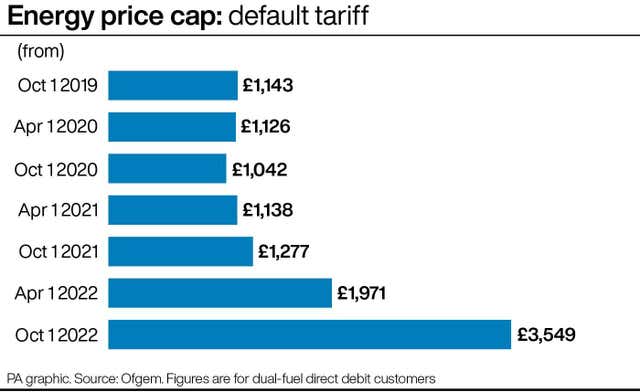
People will die this winter because of the energy price cap rise, Martin Lewis has said.
The cap come into effect for around 24 million households in England, Scotland and Wales on default energy tariffs on October 1, and will remain in place until December 31, when it will be adjusted again.
The consumer champion said the situation is a “genuine social and financial catastrophe that is putting lives at risk”, as he predicted a further 51% rise in January.
 Martin Lewis has warned of a “catastrophe” (PA)
Martin Lewis has warned of a “catastrophe” (PA)
Mr Lewis told BBC Radio 4’s Today Programme: “I’ve been accused of catastrophising over this situation.
“Well, the reason I have catastrophised is this is a catastrophe, plain and simple.
“If we do not get further government intervention on top of what was announced in May, lives will be lost this winter.”
The average household’s yearly bill will go from £1,971 to £3,549 from October.
The 4.5 million pre-payment meter customers, who are often the most vulnerable and already in fuel poverty, will see their average annual bill rise to £3,608.
 (PA Graphics)
(PA Graphics)
However, Mr Lewis said many will likely pay much more.
He said: “You could easily be paying £5,000 or £10,000 a year if you have high usage.
“I worry terribly for some of those who have disabled children or disabilities themselves who need lots of electrical equipment to keep their houses warm because of medical conditions.”
Ofgem’s chief executive, Jonathan Brearley, warned of the hardship energy prices will cause this winter.
Mr Lewis said prices for many will be “unaffordable” in January.
He added: “The prediction now in January is up another 51% on top of where we are now and that would take a typical bill and direct debit to £5,386 a year.”
Mr Lewis said a movement to refuse to pay energy bills is “growing”, as he called on the next prime minister to spend billions on tackling the crisis.
He said: “We must hope that once we have somebody in place, they will come up with a robust strong policy that we can all get behind that feeds people and heats people so we don’t have people dying because of these price cuts these winters.”
The money saving expert added: “I suspect if it isn’t in place, then people coming from the Don’t Pay movement are going to become a louder voice in this country.”


Comments: Our rules
We want our comments to be a lively and valuable part of our community - a place where readers can debate and engage with the most important local issues. The ability to comment on our stories is a privilege, not a right, however, and that privilege may be withdrawn if it is abused or misused.
Please report any comments that break our rules.
Read the rules hereLast Updated:
Report this comment Cancel